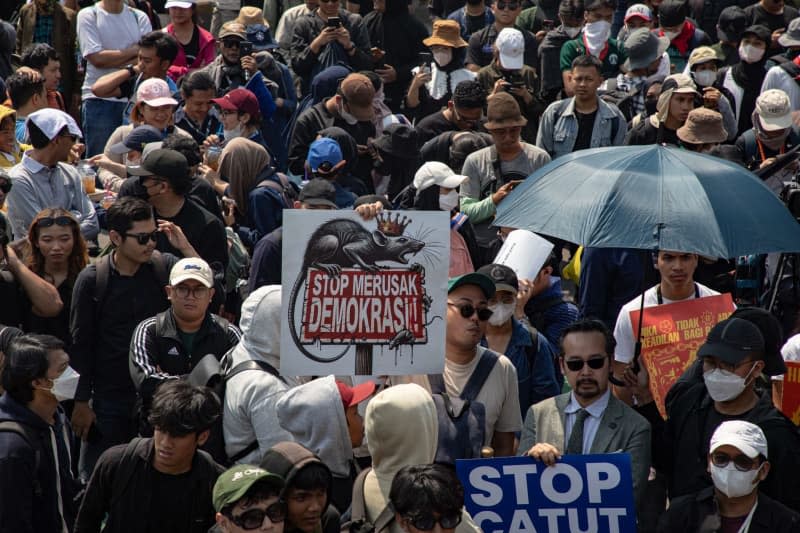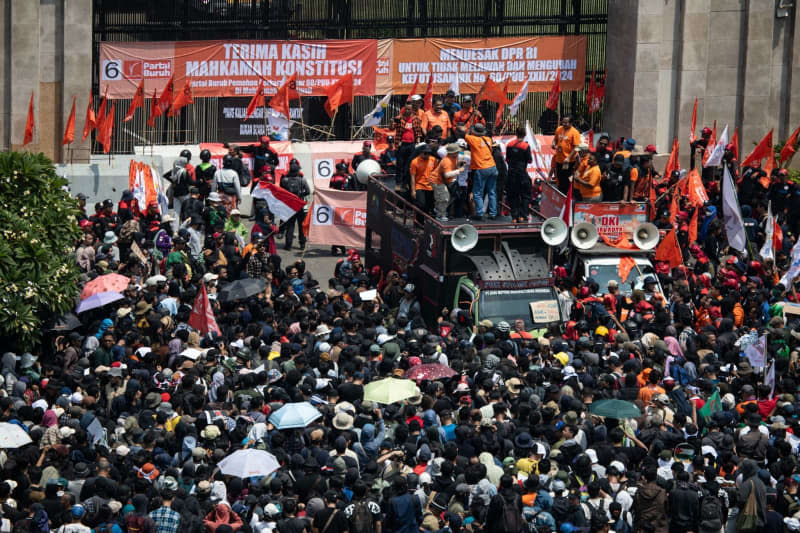Anger at outgoing President Joko Widodo and his supporters simmered in Indonesia on Friday, even after lawmakers cancelled a draft election bill that could have strengthened the president’s influence after he leaves office in October.
Lawmakers announced late Thursday that they decided to shelve the measure after thousands hit the streets to protest the draft law they said would undermine democratic principles and competitive elections.
Protests continued on Friday, with people rallying at the national elections commission in Jakarta.
The controversial bill was introduced just a day after a landmark decision on Wednesday by the Constitutional Court.
The top court relaxed the rules for regional elections, allowing smaller parties and more candidates greater opportunities to compete.
Previously, political parties or coalitions needed to hold at least 20% of the seats in the provincial council or have received 25% of the popular vote to put forward a candidate, benefiting parties aligned with Joko, who has held office for nearly 10 years, and his successor, former general Prabowo Subianto.
But on Thursday lawmakers in parliament – which is dominated by supporters of Joko – began work on a bill to reverse parts of the court’s decision.
That move was met with condemnation and sparked nationwide protests.
A senior member of parliament said late Thursday that the bill was scrapped.
“As the regional election bill has not yet become law, the Constitutional Court’s ruling will apply,” deputy parliamentary speaker Sufmi Dasco Ahmad told reporters.
The court’s ruling significantly altered the rules for nominating candidates in regional elections, as well as the minimum age to hold office.
Prabowo and Joko’s eldest son, Gibran Rakabuming Raka, are scheduled to be sworn in as president and vice president on October 20.
The new regulations set lower thresholds based on the size of the electorate in each Indonesian province, opening the political field to more competition.
The court’s decision also effectively disqualified Joko’s youngest son, Kaesang Pangarep, from running for the office of deputy governor in Central Java province, as he will only reach the required minimum age of 30 after the elections in November.
This has been seen as a blow to Joko’s attempts to build a political dynasty, following a similar ruling last year that enabled his other son, Gibran, to successfully run for vice president. At that the time the court was led by Joko’s brother-in-law, Anwar Usman.
Joko’s son-in-law, Bobby Nasution, is running for governor of North Sumatra after serving as the mayor of Medan.
In the hours before the parliament was scheduled to pass the bill by acclamation on Thursday, over 2,000 people gathered in protest outside the parliament building in Jakarta.
The demonstration quickly turned violent, with protesters setting fire to tires and broke the gates, forcing police to fire tear gas and water cannon.
Similar protests took place in other Indonesian cities.











